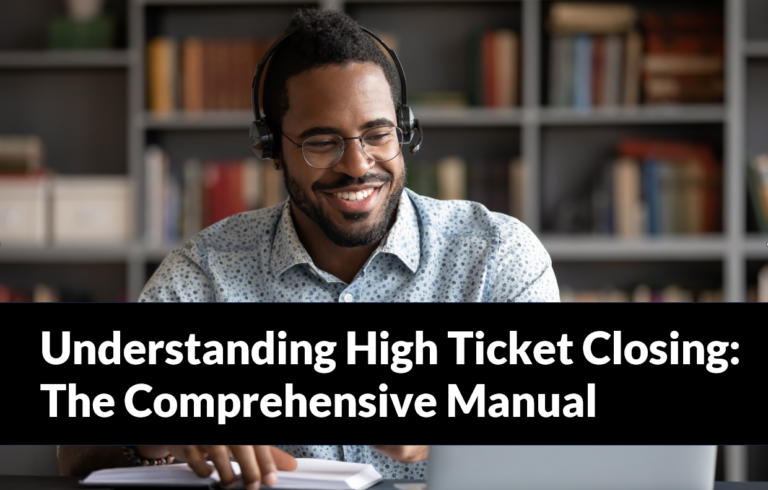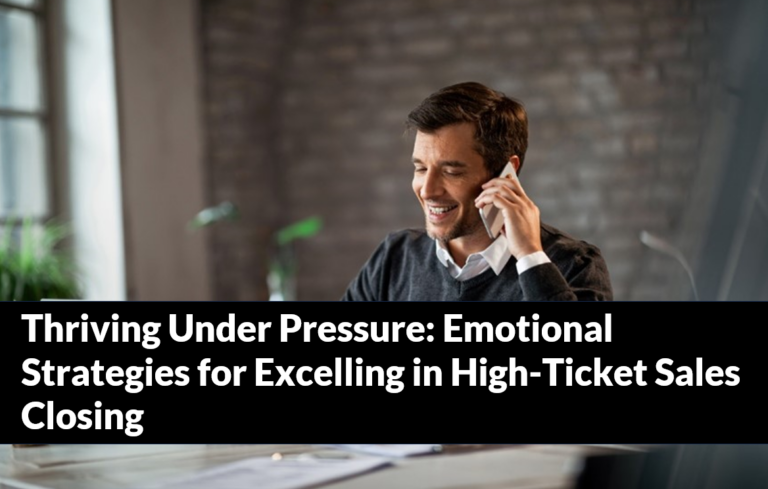How to Master High Ticket Closing

Introduction
In the realm of sales and marketing, mastering high ticket closing is a skill as challenging as it is rewarding. It’s an art that takes time, dedication, and an uncanny understanding of human psychology. But, here’s the kicker: it’s entirely doable, and we’re here to guide you through it.
Understanding High Ticket Closing
Before diving into the hows, let’s clarify the what: High Ticket Closing. These aren’t your everyday items up for grabs; we’re talking about premium products or services ranging from high-end electronics to real estate investments. High ticket items can also extend to exclusive experiences, memberships, or bespoke services.
Why High Ticket Closing Matters
If you’ve ever doubted the importance of high ticket closing, it’s time to reconsider. Selling high ticket items not only boosts your revenue significantly but also enhances your brand’s image. It positions you as a provider of premium goods and services, and clients will see you as a trusted authority in your niche.
Components of High Ticket Closing
High ticket closing isn’t a one-size-fits-all approach. It involves a combination of distinct elements, each contributing to the overall closing process. Let’s take a closer look:
- Understanding the Prospect: You need to comprehend your prospect’s needs, wants, and pains to offer them a solution that’s truly valuable.
- Building Relationships: Unlike regular sales, high ticket sales require building meaningful relationships with prospects. You’re not just selling a product; you’re creating a unique, lasting experience.
- Perfecting Your Pitch: Your pitch needs to be compelling, addressing your prospect’s pain points and presenting your product or service as the ideal solution.
- Handling Objections: Objections are common, and handling them efficiently is crucial in high ticket closing. It’s about repositioning the objections as opportunities to further demonstrate the value of your offering.
Mastering the Art of High Ticket Closing
Now that we’ve unpacked the components let’s get down to business: mastering high ticket closing.
1. Understand Your Value Proposition:
Before you can sell a high ticket item, you need to fully understand its value. Familiarize yourself with every feature, every benefit, and how it solves a particular problem for your prospect.
2. Develop Emotional Intelligence:
High ticket closing is as much about emotions as it is about logic. Emotion drives decision-making, so being able to read and respond to your prospect’s emotions can significantly increase your chances of closing the sale.
3. Build Trust and Credibility:
High ticket buyers need to trust you before they can invest a significant amount of money. Establish your credibility by sharing testimonials, case studies, or any evidence of your past successes.
4. Perfect Your Communication Skills:
Mastering communication is key. It’s not just about what you say, but how you say it. Your tone, pace, and even silence play vital roles in your communication.
5. Handle Objections with Grace:
Objections are not roadblocks, but stepping stones. Treat them as opportunities to understand your prospect’s concerns and respond effectively.
6. Follow Up Consistently:
Persistence pays off. Don’t give up after the first ‘no’. Keep the conversation going, and continue providing value until your prospect is ready to make a decision.
7. Close with Confidence:
Be assertive when closing the deal. If you’ve done everything right, your prospect should be ready to take the plunge. Don’t hesitate – ask for the sale.
Conclusion
Mastering high ticket closing doesn’t happen overnight. It takes practice, perseverance, and a pinch of patience. It’s about understanding your prospect’s needs, building solid relationships, delivering value, and sealing the deal with confidence. But once you’ve got the hang of it, the rewards are well worth the effort. So, roll up your sleeves, take a deep breath, and get ready to become a master of high ticket closing.






